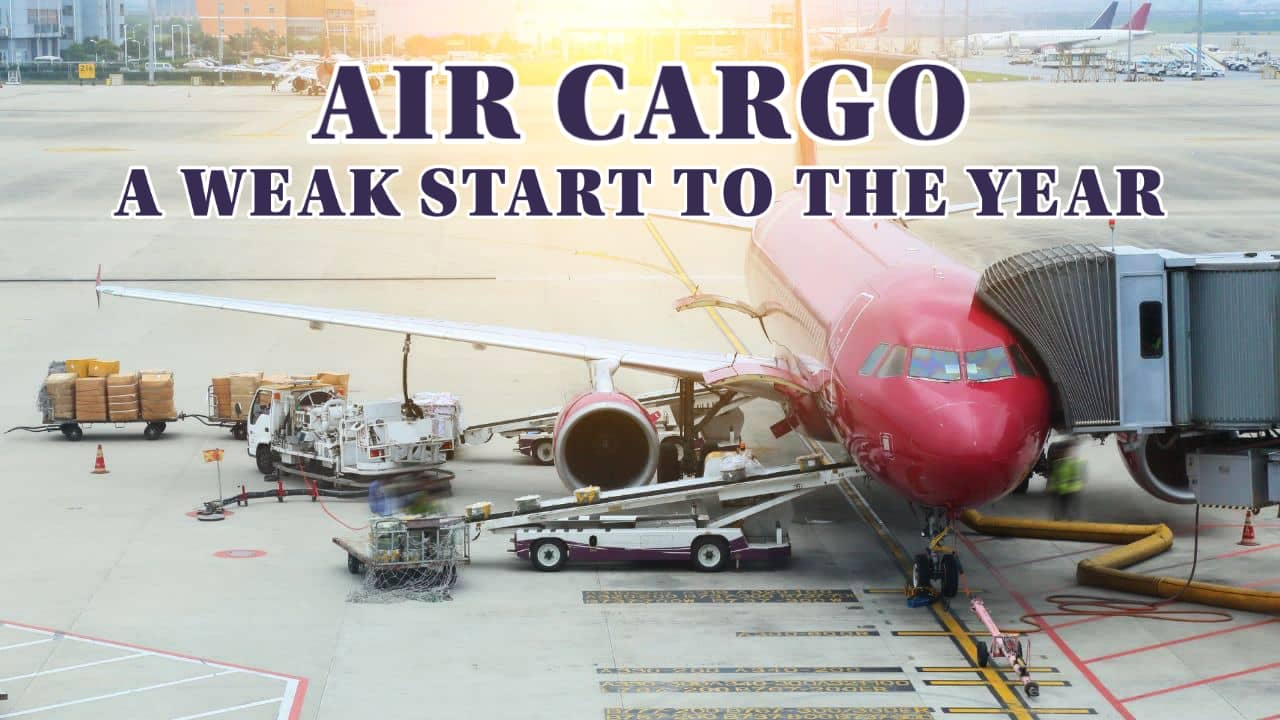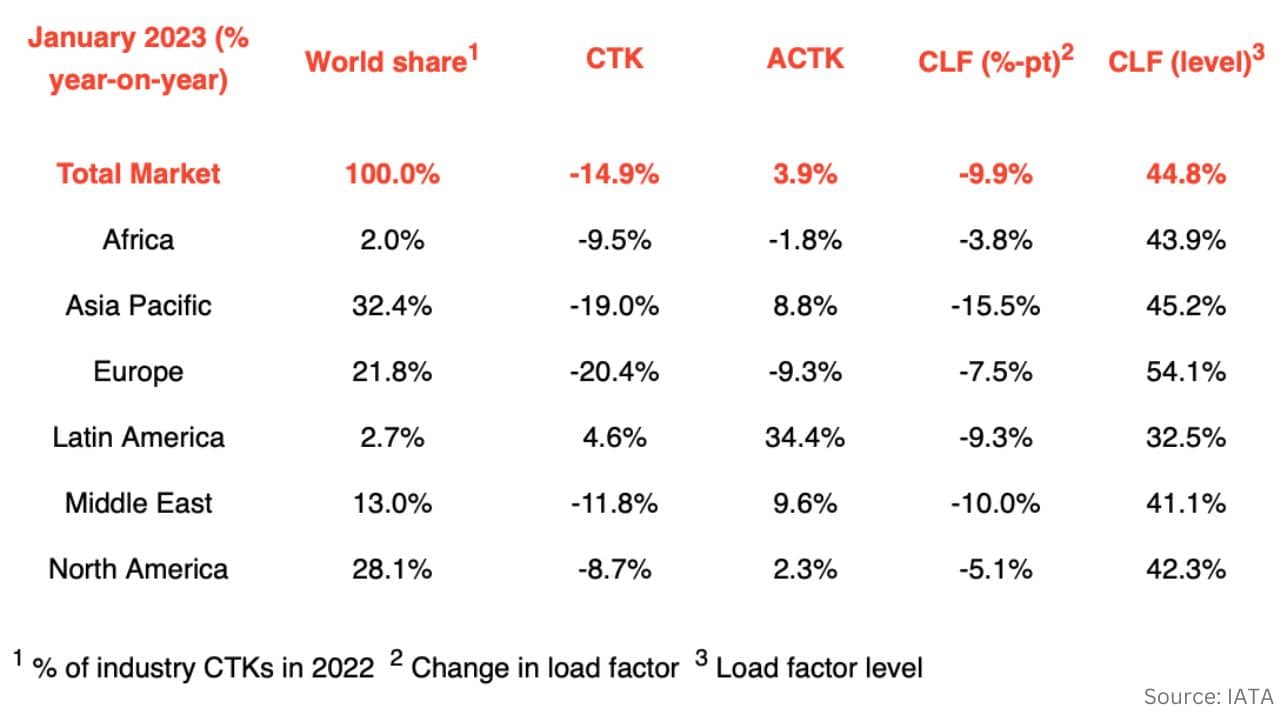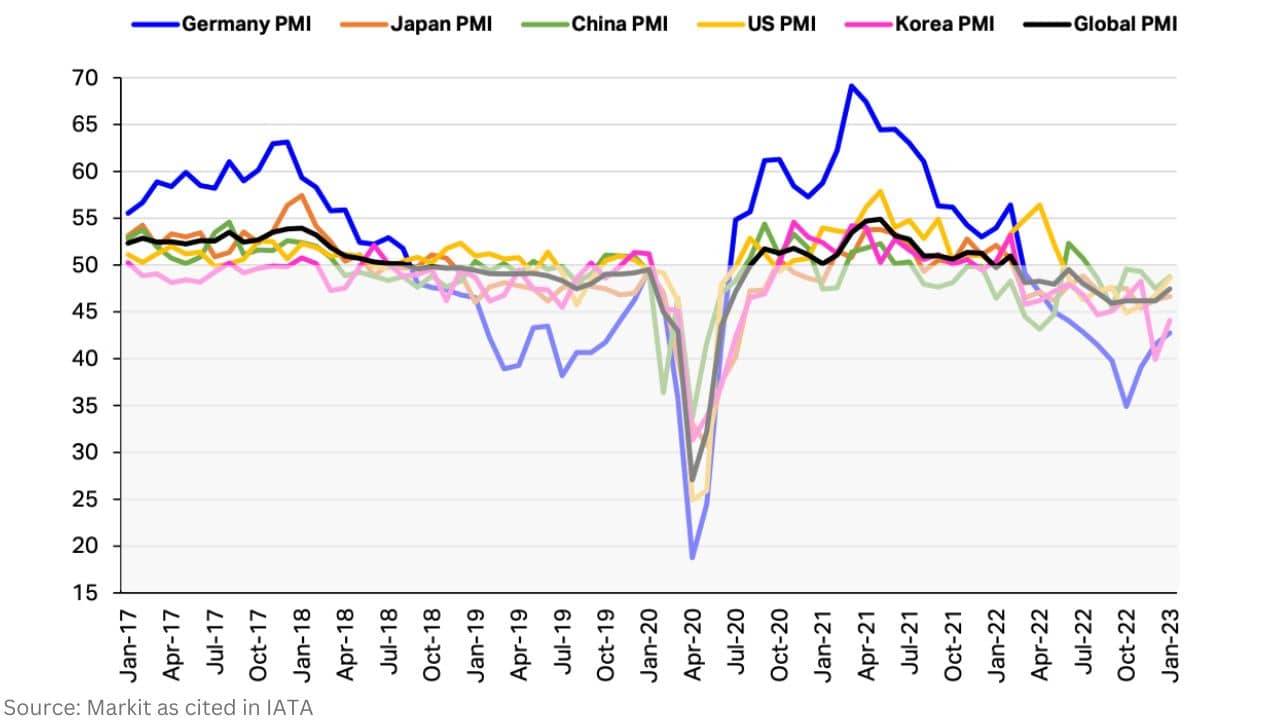
Air Cargo Makes a Soft Start to 2023
3-minute read
The International Air Transport Association (IATA) released data for January 2023 on global air cargo markets showing that air cargo demand declined as economic headwinds persist.
- Industry-wide cargo global demand, measured in tonne-kilometers (CTKs) continued to decline in January, falling 14.9% year-on-year (YoY) and marking the 11th month of consecutive annual declines. Compared with pre-pandemic levels, air cargo demand was also down 11%.
- Cargo capacity – measured by available cargo tonne-kilometers (ACTKs) – picked up 3.9% YoY in January, reflecting the strong recovery of belly cargo capacity in passenger airline markets. Cargo load factors stood at 44.8%, after falling 9.9 percentage points below load factors in January 2022.
- The economic outlook for the air cargo industry in 2023 is expected to be a challenging one. Multiple macroeconomic headwinds stemming from the global pandemic persist and the ongoing war in Ukraine has disrupted important trade flows and economic activity across various regions.

Factors in the operating environment affecting air cargo demand
- The global new export orders component of the manufacturing PMI, a leading indicator of cargo demand, increased in January for the first time since October 2022. For major economies, new export orders are growing, and in China and the US, PMI levels are close to the critical 50-mark indicating that demand for manufactured goods from the world’s two largest economies is stabilizing.
- Global goods trade decreased by 3.0% in December, this was the second monthly decline in a row.
- The Consumer Price Index for G7 countries decreased from 7.4% in November to 6.7% in January. Inflation in producer (input) prices reduced by 2.2 percentage points to 9.6% in December.

”With January cargo demand down 14.9% and capacity up 3.9%, 2023 began under some challenging business conditions. That was accompanied by persistent uncertainties, including war in Ukraine, inflation, and labor shortages. But there is solid ground for some cautious optimism about air cargo. Yields remain higher than pre-pandemic. And China’s much faster than expected shift from its zero COVID policy is stabilizing production conditions in air cargo’s largest source market. That will give a much-needed demand boost as companies increase their engagement with China,” said Willie Walsh, IATA’s Director General.
January Regional Performance for Asia-Pacific
Asia-Pacific airlines saw their air cargo volumes decrease by 19% in January 2023 compared to the same month in 2022. This was an improvement in performance compared to December (-21.2%).
Airlines in the region continue to be impacted by lower levels of trade and manufacturing activity and disruptions in supply chains due to the residual effects of COVID restrictions that were imposed by China.
Additionally, the positioning of the Lunar New Year would have impacted cargo volumes in January. Available capacity in the region increased by 8.8% compared to January 2022.
Passenger Demand Stays Strong in January
The IATA also announced that the recovery in air travel demand is continuing in 2023, based on January traffic results.
- Total traffic in January 2023 (measured in revenue passenger kilometers or RPKs) rose 67.0% compared to January 2022. Globally, traffic is now at 84.2% of January 2019 levels.
- Domestic traffic for January 2023 rose 32.7% compared to the year-ago period, helped by the lifting of the zero-COVID policy in China. Total January 2023 domestic traffic was at 97.4% of the January 2019 level.
- International traffic climbed 104.0% versus January 2022 with all markets recording strong growth, led by carriers in the Asia-Pacific region. International RPKs reached 77.0% of January 2019 levels.
“Air travel demand is off to a very healthy start in 2023. The rapid removal of COVID-19 restrictions for Chinese domestic and international travel bodes well for the continued strong industry recovery from the pandemic throughout the year. And, importantly, we have not seen the many economic and geopolitical uncertainties of the day dampening demand for travel,” said Willie Walsh, IATA’s Director General.
Source: IATA
P.S. Easy Freight Ltd helps New Zealand importers & exporters to save money on international freight and reduce mistakes by guiding how to comply with Customs and biosecurity rules.
➔ Contact us now to learn how we can assist you.
